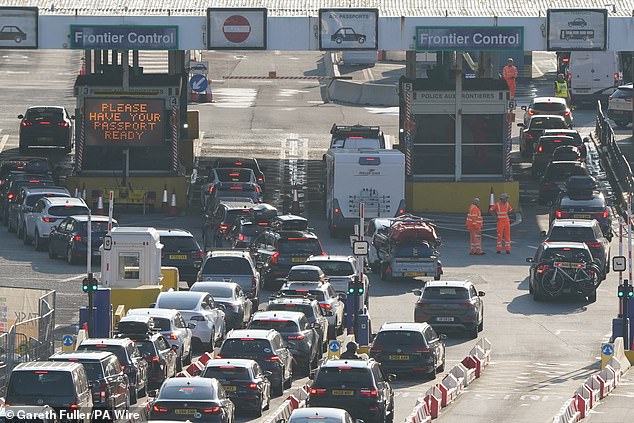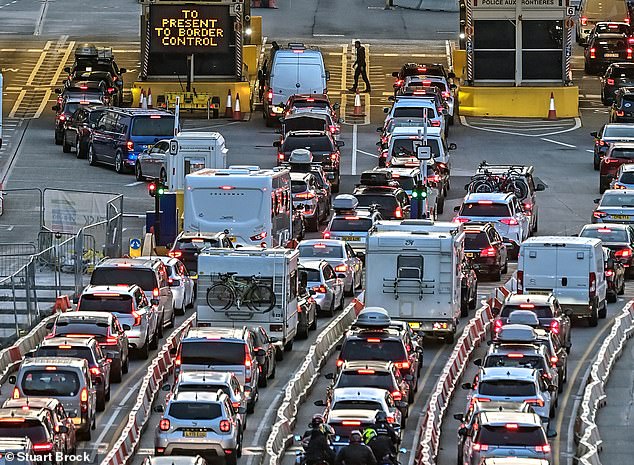The government has called on Brussels to relax rules on fingerprint checks at borders amid fears this could cause chaos for British tourists entering Europe next summer.
Britons travelling to the EU from 17 November will have their fingerprints scanned, have their photograph taken and will be required to show their passport when they enter Europe for the first time.
But the UK government has expressed concern that the new border system could cause havoc on the roads at Dover, when thousands of holidaymakers will have to undergo biometric checks before crossing the Channel.
Dover is bracing for delays of up to 14 hours, with Kent County Council warning that traffic jams could be “much worse” than the 23-mile jams seen in 2022.
In a statement to the House of Commons, immigration minister Seema Malhotra said the government was lobbying the European Commission to extend emergency measures to allow French border officials to speed up the passage of travellers during peak times.
Britons travelling to the EU from 17 November will have their fingerprints scanned, have their photograph taken and will have to show their passport when they enter Europe for the first time. Pictured: A queue of cars at the port of Dover in Kent
The plans would mean border guards would not have to take fingerprints or photographs if there are “excessive” queues at the port of Dover.
But the measures are only proposed for the first six months after the new system is introduced, and Britain is calling for them to be extended beyond the summer holiday period, when queues will be longest.
“We believe that extending these deadlines beyond six months would improve throughput at the EU’s external borders if queues form during peak periods in early 2025 due to the additional processing time required for the EES,” Malhotra said.
There are also fears that disruptions caused by the launch of the Entry/Exit System (EES) could last even longer, as an app allowing tourists to register their details before travelling will not be ready until late 2025.
The European Scrutiny Committee has received evidence that the implementation to reduce waiting times at “juxtaposed checkpoint” sites, such as at Dover, Eurotunnel or Eurostar at St Pancras station, is facing delays due to the complexities of aligning it between member states.
Malhotra added that the EES would increase processing times at border crossings where UK travellers enter the Schengen Area.
“Insufficient progress has been made to ensure that these impacts (as well as other potential impacts) are minimised, and disruption is likely to occur when the plan is introduced,” he said.
‘This is particularly true for journeys involving passage through London St Pancras station, the Channel Tunnel at Folkestone and the port of Dover.’

Dover braces for delays of up to 14 hours, with Kent County Council warning that traffic jams could be ‘much worse’ than 23-mile jams seen in 2022
On Monday, the Interior Ministry also announced new legislation that will allow French border guards to operate within an expanded border control zone at Dover to prevent long queues forming as tourists undergo biometric checks.
French border guards are currently only allowed to operate on the eastern quays, but under the new legislation they will be able to do so on the western quays, where there will be specific facilities to deal with coach travellers.
The EES will collect personal data, including name, surname, date of birth, nationality, sex, travel document and the three-letter country code, with only children under 12 years of age being exempt.
This is an automated computer system that will track travellers from non-EU countries entering and leaving European Union member states.
A fixed launch date has been set for 17 November, with no possibility of extension, and the date will be formally confirmed at a meeting in Brussels next week.
European Commission spokesperson Christian Wigand said: ‘The roadmap for the delivery of the new IT architecture foresees that the entry and exit system will be ready for operation in autumn 2024 and that ETIAS (European Travel Information and Authorisation System) will be ready for operation in spring 2025.
“The exact date will be determined by the European Commission and announced on the official EES website well in advance of the start of operations. We do not have a date to communicate at this time.”
A Home Office spokesman said: “The EU will introduce a new entry and exit system in the autumn and the new Government is reviewing the preparations that have been made so far.”


